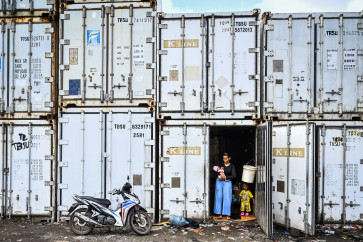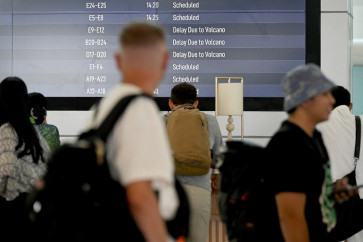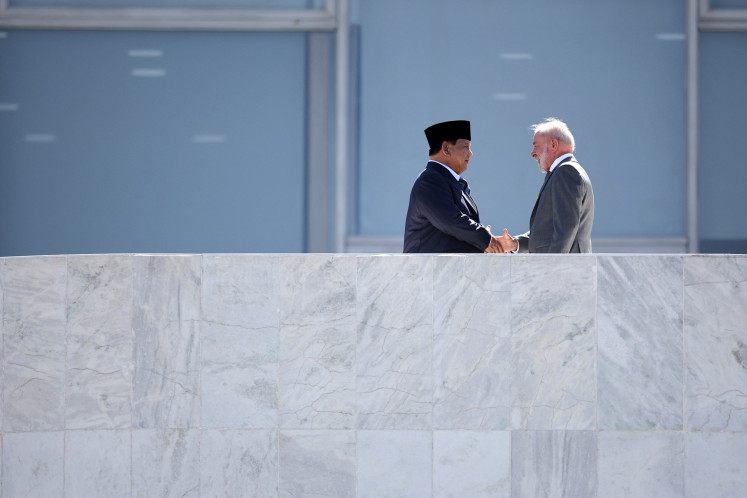Popular Reads
Top Results
Can't find what you're looking for?
View all search resultsPopular Reads
Top Results
Can't find what you're looking for?
View all search resultsVolcanic ash threatens health, flights in Bali
Safety first: Airport employees cover a planeâs engine with protective film at Ngurah Rai International Airport in Denpasar, Bali, on Wednesday
Change text size
Gift Premium Articles
to Anyone
 Safety first: Airport employees cover a planeâs engine with protective film at Ngurah Rai International Airport in Denpasar, Bali, on Wednesday. The airport has been temporarily closed because of the erupting Mount Barujari on the neighboring island of Lombok, which has been spewing ash for three days.(JP/Agung Parameswara) (JP/Agung Parameswara)
Safety first: Airport employees cover a planeâs engine with protective film at Ngurah Rai International Airport in Denpasar, Bali, on Wednesday. The airport has been temporarily closed because of the erupting Mount Barujari on the neighboring island of Lombok, which has been spewing ash for three days.(JP/Agung Parameswara) (JP/Agung Parameswara)
S
span class="caption">Safety first: Airport employees cover a plane's engine with protective film at Ngurah Rai International Airport in Denpasar, Bali, on Wednesday. The airport has been temporarily closed because of the erupting Mount Barujari on the neighboring island of Lombok, which has been spewing ash for three days.(JP/Agung Parameswara)
Volcanic ash from the erupting Mount Barujari, a subvolcano of Mt. Rinjani in West Nusa Tenggara, has blanketed surrounding regions, including the resort island of Bali, putting local residents' health at risk and causing problems for air travel.
'The ash was not very thick. But we urged all residents to be alert and wear masks to avoid possible eye irritations and respiratory problems,' Bali Disaster Mitigation Agency (BPBD) head Dewa Made Indra told The Jakarta Post on Wednesday.
The ash covered parts of regencies including Karangasem, Klungkung, Gianyar, Bangli and Tabanan, all in Bali, and Banyuwangi in East Java.
Indra said his agency had distributed masks to motorists and residents in the Bali regencies to reduce the impact of the volcanic dust.
'Today, we have distributed around 5,000 masks. We will continue to distribute more masks in the next few days if the ash is still covering Bali,' he said.
Besides the threat to health, the ash has also forced authorities to temporarily close Ngurah Rai International Airport, delaying flights at the country's third busiest airport.
The closure, which began on Tuesday evening, has resulted in the cancelation of 692 flights, both domestic and international, leaving 6,000 passengers stranded.
To assist affected passengers, airport authorities ran a transfer service to Terminal Ubung, the departure point in Denpasar for interregional buses, and gave directions on how to rent vehicles to drive to Surabaya in East Java.
Many passengers decided to travel to Surabaya to continue their journeys from Juanda International Airport, which remains open.
Those who remained in Bali included Indian Vice President Mohammad Hamid Ansari and his entourage, whose flight to end a four-day visit to Indonesia was canceled.
'The flight should have taken off at 3 p.m. today, but was canceled because of the volcanic ash. We scheduled the flight for tomorrow morning [Thursday],' said the co-general manager of state-owned airport operator Angkasa Pura I, I Gusti Ngurah Ardita.
Ansari's Air India Boeing 747 aircraft was seen among a total of 36 planes parked on the airport's apron. All the aircraft's engines were covered with plastic or canvas to protect them from the ash.
'Volcanic ash can damage the engines. So all aircraft engines were covered to prevent any impact from the volcanic ash,' said the Transportation Ministry's Bali and Nusa Tenggara airport authority chief, Yusfandri Gona.
Gona said three airports had been closed for safety reasons following the eruption ' Ngurah Rai, Selaparang Airport in Lombok and Blimbingsari Airport in Banyuwangi, East Java.
The closure of Ngurah Rai also delayed the deportation of Indian fugitive Rajendra Sadashiv Nikalje to India. Nikalje, who was arrested in Bali last week, was scheduled to be deported on Tuesday night, but it was postponed.
'We will delay the deportation plan. We will deport him as soon as the airport reopens,' said Bali Police spokesperson Sr. Comr. Hery Wiyanto.
Meanwhile, Indian tourist Shruti Ambikar, who had recently finished her honeymoon in Bali, was worried that the eruption might force her to stay longer on the island.
'I really hope that we can depart today as we should work on Friday. But, we understand that we can
not go because of the weather,' Ambikar, scheduled to fly with Malindo Air to Mumbai via Kuala Lumpur, said.
National Disaster Mitigation Agency (BNPB) spokesman Sutopo Purwo Nugroho said the agency and the local BPBD had declared a Level 2 alert for Mt. Rinjani following intensified volcanic activity on Wednesday. Mt Barujari, which is located inside the caldera of Mt. Rinjani, is continuing to emit volcanic ash that is spreading to the west and southwest.
_____________________________
To receive comprehensive and earlier access to The Jakarta Post print edition, please subscribe to our epaper through iOS' iTunes, Android's Google Play, Blackberry World or Microsoft's Windows Store. Subscription includes free daily editions of The Nation, The Star Malaysia, the Philippine Daily Inquirer and Asia News.
For print subscription, please contact our call center at (+6221) 5360014 or subscription@thejakartapost.com









